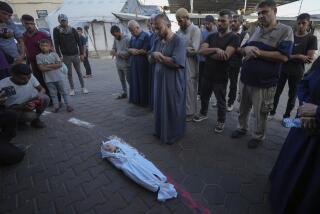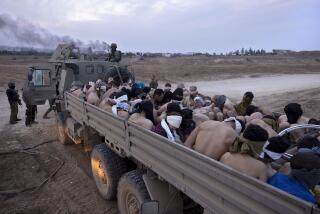TREATING THE WOUNDED
- Share via
A. Wounded soldiers are treated by medical teams assigned to all infantry platoons. The first hour after injury is crucial. The wounded must be stabilized, by stopping bleeding and providing intravenous fluids.
B. Victims with significant injuries are sent back toward the rear to a MASH (mobile Army surgical hospital) unit for antibiotics and skilled surgical care.
C. Seriously injured soldiers go to a fleet or ship hospital, which has the capability to perform any operation short of open-heart or brain surgery. The most serious cases would be flown to hospitals in Europe of the U.S. The Air Force is capable of evacuating 1,000 patients a day to Germany.
Inside a Hospital Ship Water line Medical repair Casualty reception Decontamination Elevators Medical supplies Wards Helicopter platform Sick call clinic Operating rooms (12) Pharmacy Elevators Recovery Wards Lab
In Vietnam, the average delay between injury and hospital treatment was about two hours, thanks to the extensive use of helicopter evacuations. That compares to average delays of 5 hours in the Korean War and 10 hours during World War II.
Source: Jane’s Ships, Department of Defense, Daily Telegraph, AP
Allied Military Hospitals Air Force Wiesbaden, Germany: Air Force Medical Center. Recently expanded from 185 to 265 beds Incirlik, Turkey: Regional Hospital Contingency Hospitals (for back-up usage) Zweibruecken, Germany Gloucestershire, England: RAF Little Rissington Hospital; 1,500 beds Lincolnshire, England: RAF Nocton Hall Hospital; 750 beds Oxfordshire, England: RAF Bicester Hospital; 500 beds
All four of the above hospitals were being set up in late October, according to a report in Stars & Stripes, Nov. 19, 1990. 4,500 people would staff the four facilities.
Army Frankfurt Hospital, Germany; 300 beds Landstuhl Hospital, Germany; 300 beds Nuremberg Hospital, Germany Navy Two hospital ships, the Comfort and the Mercy, are deployed in the Persian Gulf. Both are former oil tankers, converted to hospital ships. They each have 1,000 beds, 12 operating theaters, and a crew of 900. Fleet Hospital 5, set up in Saudi Arabia’s Eastern province, has 500 beds, 6 operating theaters, and is staffed by 80 doctors. British Hospitals Jubayl, Saudi Arabia: Base hospital Akrotiri, Cyprus: RAF base hospital RN Argus: Hospital ship deployed in the Gulf Spain has pledged the use of 1,500 beds in its military hospitals Source: Department of Defense, Daily Telegraph, AP
More to Read
Sign up for Essential California
The most important California stories and recommendations in your inbox every morning.
You may occasionally receive promotional content from the Los Angeles Times.













